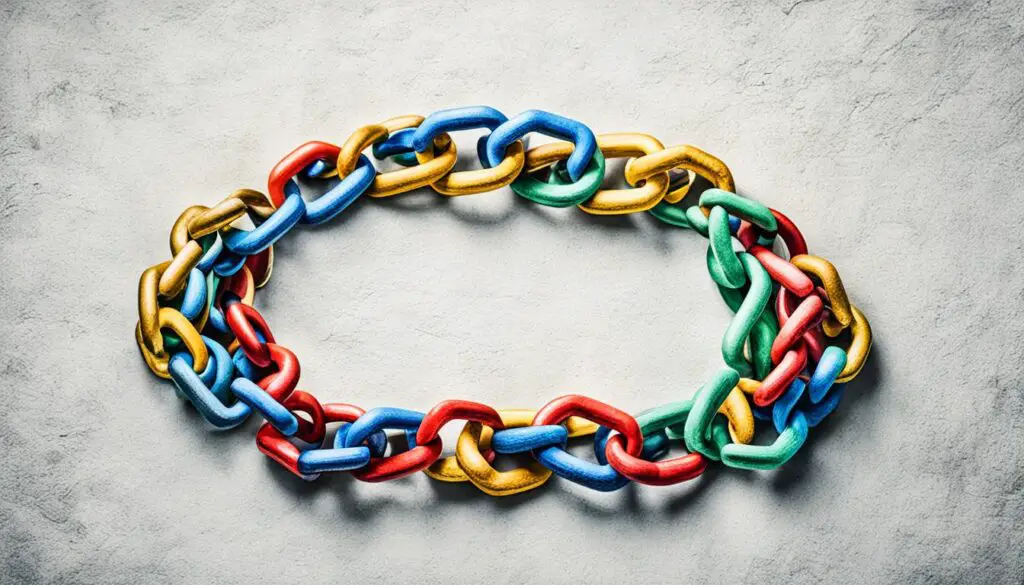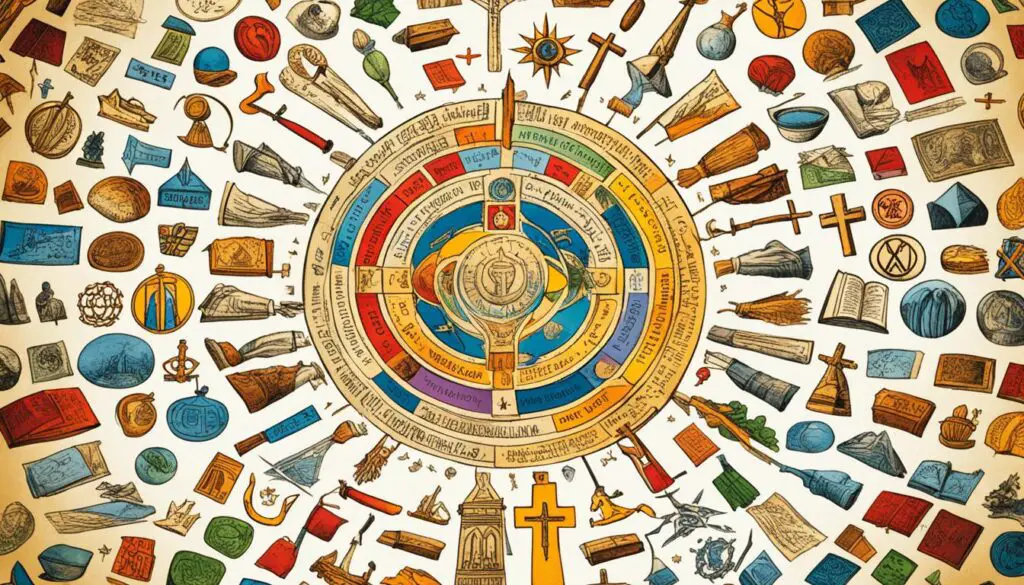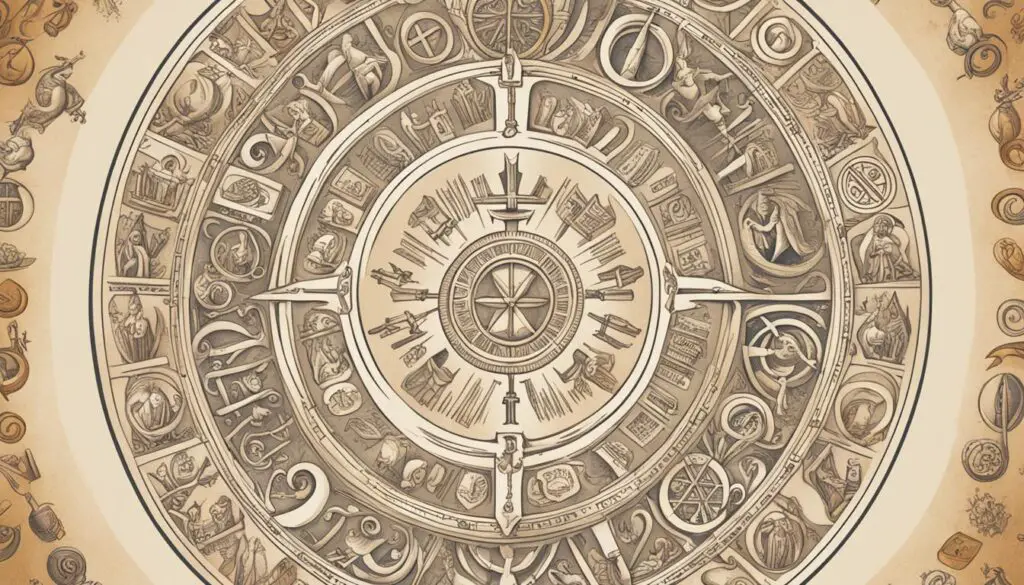There are many denominations within the Christian faith. This variety, with different teachings and ways of worship, can be overwhelming. I, too, have thought a lot about this, wondering why there are so many.
Sitting in church one Sunday, I saw how diverse we were. People of different backgrounds filled the pews. Each carried their own story and connection to God. It hit me then that denominations show the beautiful variety of faith in Christ.
Denominations are like different types of currency. They give us choices in our faith journey. Just as currencies have various values, Christian denominations bring different ways to understand the Gospel.
Sometimes, disagreements happen because of these differences. But, we all share the same faith and love for Christ. Even though our worship may look different, our hearts are united in serving the Lord.
Let’s explore why there are so many denominations. And let’s learn how to celebrate our unity within these differences. By looking at history, theology, and culture, we can grow in love and respect. Let’s make understanding and unity our focus as we journey through Christianity’s diverse paths.
Key Takeaways:
- Denominations within Christianity represent a rich tapestry of faith and offer diverse perspectives and approaches to the Gospel.
- While denominations may sometimes lead to disagreements, unity in love for Christ remains a core value.
- Exploring the reasons behind the proliferation of denominations can help us navigate the diverse landscape of Christianity with understanding and respect.
- Denominations, like different denominations of currency, provide options and enable individuals to find a spiritual home that aligns with their beliefs.
- Embracing unity amidst denominational differences requires an open heart, a willingness to learn from one another, and a focus on our common faith in Christ.
Biblical Definition of Denominations
Christian denominations, like Presbyterian and Lutheran, believe in Jesus Christ as Savior. But they have different ways of understanding some parts of the Bible. They are not like cults, such as Mormons and Jehovah’s Witnesses. Cults say they are Christian but change important Christian beliefs completely. This makes them not part of Christian denominations. Also, religions like Islam and Buddhism are completely different categories outside Christianity.
Christian groups form based on their own views of the Bible and their teachings. They also reflect different cultures and theological focuses. While their worship and rituals may vary, Christian denominations agree on the core beliefs about Jesus. This key belief makes denominations distinct from cults and non-Christian religions.
The Protestant Reformation and the Emergence of Denominations
The 16th century had a big movement, the Protestant Reformation. It tried to change the Roman Catholic Church. This was a big change in the Christian faith, leading to many denominations we see today.
Famous people like Martin Luther, John Calvin, and Huldrych Zwingli weren’t happy with how the church was. They wanted to follow the Bible’s teachings closely and have a personal connection with God.
After the Reformation, we saw new Protestant groups. There were now Lutheran, Reformed, Anabaptist, and Anglican denominations. These laid the groundwork for more groups to form in the future.
“The Protestant Reformation was a catalyst for change, as individuals and communities sought to rediscover and reinterpret the Christian faith.”
The Lutheran Tradition
Martin Luther started the Lutheran tradition. He was a German monk who sparked change by posting his Ninety-Five Theses in Wittenberg in 1517. Luther mainly talked about faith, the role of every believer, and the Bible’s importance.
The Reformed Tradition
The Reformed tradition comes from John Calvin’s teachings, known as Calvinism. Calvin was French and focused on God’s plan, His rule, and leading a devout life as a Christian.
The Anabaptist Tradition
Anabaptists were part of the Radical Reformation. They focused on adult baptism and having the freedom to choose your church. They didn’t agree with baptizing babies and wanted the church and politics separate.
The Anglican Tradition
King Henry VIII and Thomas Cranmer led the Anglican tradition in England. They kept many Catholic rituals but changed some beliefs. This was the start of the Anglican Church.
Out of these traditions, many denominations grew. Each one has its own beliefs and ways of worshiping and practicing the Christian faith. There are groups like the Presbyterian, Methodist, Baptist, Pentecostal, and many more.
The way Christianity is divided into denominations is because of the Protestant Reformation. It has added diverse choices for people to find their own way to worship and practice faith.

| Denomination | Founder(s) | Year Founded |
|---|---|---|
| Lutheran | Martin Luther | 16th century |
| Reformed | John Calvin | 16th century |
| Anabaptist | Various leaders within the Radical Reformation | 16th century |
| Anglican | King Henry VIII, Thomas Cranmer | 16th century |
Factors Contributing to the Diversity of Denominations
Christianity has many denominations for reasons like different beliefs and ways of worship. They also vary in what they think the Bible means and in some church rules. These differences have formed the many groups we see today.
Differences in Doctrine
Many Christian groups don’t agree on big questions like how to be saved or the nature of God. This is a key reason for the wide range of denominations. They also may see things in the Bible differently, like the Holy Spirit’s role or what biblical prophecies mean.
Worship Styles and Preferences
How people worship can separate denominations too. Some prefer formal ceremonies and follow a set order of service. Others like a more free-flowing approach, adding their own style and spiritual practices.
“The diversity of worship styles allows Christians to connect with God in ways that resonate with their individual spiritual needs.”
Interpretations of Scripture
Another reason for so many denominations is how different groups understand the Bible. They might focus on different parts of the Bible. This leads to various opinions on things like baptism, women’s roles in the church, and what the church should be like.
Disagreements on Theological Matters
Belief differences also play a big role in forming denominations. Arguments about God’s rule, predestination, free choice, and grace have often caused division. These debates have led to the creation of many different Christian groups.
Differences in culture and history have also influenced denominational variety. While these differences can lead to disagreements, they show the beautiful diversity within Christianity. They highlight how faith can be expressed in many ways.

Denominations differ in their beliefs, practices, and how they read the Bible. These differences keep the Christian faith dynamic and relevant to various personal and cultural needs.
The Downsides of Denominationalism
Denominationalism brings diversity to Christian faith. But, it can also stop Christians from being united. Instead of focusing on Christ, people often argue about their differences. This leads to fights, splits, and disagreements in the Church.
Denominationalism’s origins lie in these disputes. These often grow into deeper divides in the Church. The lack of unity makes it hard for Christians to work together. It also lessens their impact on society.
| Downsides of Denominationalism | Description |
|---|---|
| Lack of Unity | Denominations can lead to a lack of unity among Christians, inhibiting effective collaboration and cooperation. |
| Conflicts | Denominational differences often give rise to conflicts, as differing theological perspectives and practices clash. |
| Division | Denominationalism can result in divisions within the body of Christ, separating believers based on doctrinal preferences. |
| Disputes | The existence of denominations can lead to disputes over theological interpretations, sacraments, and other matters of faith. |
| Fragmentation | Denominations contribute to the fragmentation of the Church, as Christians become divided into various groups and traditions. |
Yet, it’s key to see denominational differences as issues of opinion, not faith. Most believe in Christ as Savior. Their unique beliefs and practices come from wanting to follow their faith deeply.
We can find ways to be united amidst these differences. This starts with talking openly and looking for things we agree on. By focusing on Christ’s love and teachings, we can heal the rifts caused by denominationalism.

Biblical Unity and Diversity in Denominations
Christians may worship in different ways or belong to various groups. But they are all called to love each other and have faith in Christ. It’s key to agree on the faith’s main points, but okay to differ in some practices. Christians should still love one another, talk about their differing views, and aim for unity.
Unity in Love and Faith
The main rule in Christianity is to love others, even those from different groups. Believers share a strong bond of love and faith in Christ. Paul’s letter to the Ephesians urges, “Strive to keep the unity by the peace of the Spirit” (Ephesians 4:3). This unity comes from a deep commitment to Christ, not from following the same worship or teachings exactly.
Essential Doctrines and Unity
Unity in important beliefs is really important despite some differences. These beliefs include the Trinity, Jesus’s divinity, and how we are saved. They are the bedrock of Christian faith. Knowing and agreeing on these points helps identify true Christian groups. It also helps various Christian traditions work together.
“…unity in the essentials of the faith is crucial, but there is also latitude for diversity in worship and non-essential matters.”
Latitude in Worship and Non-Essential Matters
Christian groups show their faith through various worship styles. This reflects their backgrounds and what they find meaningful. From traditional to modern types of worship, as long as the core beliefs are the same, it’s all good. This variety enriches the Church, showing different ways people can worship God.
Engaging in Dialogue and Debate
Christians learn a lot through open talks about the Bible, faith, and how they worship. These discussions help them grow and see things in new ways. It’s essential to discuss with love and respect, always aiming to love and be united, even when they don’t fully agree.
Image of Bible

Striving for Unity in Christ
The dream is for all Christians to be together, crossing the lines of their different groups. More than looking the same in worship or practice, it’s about loving and following Jesus. As Paul said, in Christ’s family, there’s no division; everyone is equal. In Christ, despite differences, believers can stand together and spread God’s love.
“…the shared love for Christ and commitment to His teachings unites Christians across denominational lines.”
The Historical Background of Denominations
Denominations started from splits in Christianity long ago. These breaks made different beliefs and groups that we have now.
In the early fourth century, the Arian controversy split Christians. Some thought Jesus was less divine than God. Others said Jesus was God in human form.
“The Arian controversy resulted in a split within the Christian community, with believers taking opposing stances on the divinity of Jesus,”
The Great Schism of 1054 made a big separation between Christians. It parted the Eastern Orthodox from the Western Roman Catholics. They disagreed on certain church practices and who had the final say.
The Protestant Reformation in the 16th century changed things a lot. Leaders like Martin Luther and John Calvin stood against Roman Catholic practices. They called for a return to the Bible’s teachings.
This reformation created many Protestant branches, each with its unique beliefs and ways of worship. They said the Bible, not the Pope, should be the main authority in the faith.
The Arian controversy, the Great Schism, and the Protestant Reformation were key moments in Christian history. They laid the foundation for the many Christian groups we see today.
Out of these old splits came a wide variety of denominations. They have different beliefs, ways of worship, and ways they’re organized. This history helps us understand why there are so many Christian groups now.
| Ancient Schism | Year |
|---|---|
| Arian Controversy | 4th century |
| Great Schism | 1054 |
| Protestant Reformation | 16th century |
The Protestant Reformation and the Proliferation of Denominations
The Protestant Reformation began with Martin Luther’s 95 Theses. It changed the Christian world, questioning the power of the Roman Catholic Church. This led to many new church groups. People started to find faith on their own, using the Bible for guidance.
Luther and others wanted to fix bad practices in the church, like selling indulgences. They said it was important for each person to read the Bible and build a personal connection with God. This created different beliefs and churches.
“Every man must do his own believing as he must do his own dying” – Martin Luther
This change showed that not only the church leaders could understand the Bible. Everyone was encouraged to learn from the text directly. This inspired different groups with their own ways of worshiping and beliefs to form.

This picture shows how the Protestant Reformation made many new types of churches.
The Reformation not only changed religion but also brought new ideas on freedom and thinking for oneself. It made people responsible for their faith journey and allowed them to choose how to worship and believe.
| Denomination | Beliefs | Distinct Practices |
|---|---|---|
| Lutheran | Justification by faith alone | Sacraments: Baptism and Communion |
| Reformed | Predestination | Emphasis on Calvinistic theology |
| Anabaptist | Believer’s baptism | Separation of church and state |
| Anglican | Episcopal church structure | Blend of Catholic and Protestant practices |
This table lists some important groups from the Reformation. It tells us what they believe and how they practice their faith.
Though many denominations are now part of Christianity, they help everyone find a place where they feel they belong. While these groups are different, they all follow Jesus. They are all part of the big Christian family. And so, we should all respect and love one another, keeping our focus on God and Jesus.
The Positive Aspects of Denominational Diversity
Denominations can lead to divisions. But, they also bring many good things to the faith. This diversity lets in a sea of different views and ways to be Christian. It makes our world a more open and kind place.
This diversity helps people who might not have much say before. They can now speak up when things seem off in the church. This leads to better checks on power and fairer actions.
“Denominational diversity creates an environment where individuals have the freedom to challenge and critique practices that may undermine the true essence of Christianity, thus safeguarding the integrity of the faith,”
Diversity also means different ways to read the Bible and how we worship. It helps us talk more and learn from each other. This makes us understand the Bible better and deepen our faith.
When we welcome different ideas, it makes us smarter about our faith. This thinking helps us be closer to God. It also makes us eager to learn more and grow in our faith.
In a rich tapestry of beliefs, everyone can find their place. People can worship and think as they believe is best. This makes our faith more personal and alive, based on our special view of God’s word.
Denominational Diversity Strengthens Religious Autonomy:
| Positive Aspect | Explanation |
|---|---|
| Agency for lower social positions | Allows individuals to question corrupt or questionable practices within religious establishments. |
| Critique of corrupt practices | Promotes transparency, accountability, and Justice within religious establishments. |
| Diversity in interpretations | Encourages a vibrant exchange of ideas and fosters a deeper understanding of Scripture. |
| Religious autonomy | Enables believers to develop a personal connection with their faith based on individual interpretation of Scripture. |
Embracing diversity means seeing the many colors of Christianity. It asks for respect and love for all. Real unity in Christ comes from loving and valuing every person.

The Challenges of Denominational Disagreements
Christian denominations often disagree about the Bible, sacraments, and other theological issues. These disagreements lead to discussions and debates. They can help or hurt efforts to stay united within the body of Christ.
The Interpretation of Scripture
Different understandings of the Bible often lead to disagreements between denominations. When people and groups study the Bible, they come to their own interpretations. This can cause tension and make it hard for denominations to work together.
“The Bible is a complex and rich collection of texts that can be understood differently by different believers. It is important to approach discussions on biblical interpretation with humility and respect for the diversity of perspectives within the body of Christ.”
The Sacraments
Sacraments are also a major area of disagreement. Differences in how baptism, communion, and other rituals are understood can cause rifts between denominations. These disagreements can prevent cooperation and unity.
Biblical Debates
Debates on broader biblical issues can further divide denominations. Topics like the role of women in church, salvation, or end times prophecy can stir strong emotions. This may lead to splits and a lack of unity.
However, these disagreements also provide a chance for growth and learning. By discussing these issues with open minds and a search for truth, believers can strengthen their faith. They may also find common ground, which builds unity within Christ’s body.

To overcome denominational disagreements, Christians must show love, respect, and a listening ear. They should focus on what they agree on in terms of essential beliefs and core teachings. This way, they can maintain unity while appreciating the diversity that comes with different denominations.
Embracing Unity amid Denominational Differences
Christianity has many groups, or denominations, but all are called to unite. We should focus on what we all believe. This way, we can strengthen our love, respect, and understanding. Our main goal is to worship God and follow Jesus’ teachings together.
In essentials, unity. In non-essentials, liberty. In all things, love.
St. Augustine’s quote is a wonderful guide for Christians. It tells us to come together on important beliefs. Such as Jesus being God’s son, faith saves us, and the Bible is our guide. This helps us see eye to eye and understand each other.
But, it’s okay to have different views on less important topics. Things like how we worship, our church rituals, and our Bible interpretations can differ. As long as we agree on the big beliefs, we should respect each other’s choices.
Being one in faith doesn’t mean we should all act or believe the same way. It means our love for God and our wish to follow Jesus don’t have barriers. We can share and learn from each other, loving our differences. Together, we are strong in spreading the gospel.
Embracing Love and Respect
To build unity, love and respect are key. We should approach others with an open heart and mind. Ready to listen and learn from each other. We grow by understanding how rich and varied the Church is.
This love and respect are for all Christians, not just like-minded ones. We must see the good in different church traditions. And work together for good causes and God’s mission. This makes the Church stronger and spreads Christ’s message further.
Unity in Action
Unity isn’t just a nice idea; it needs work. We can combine our efforts with other believers in community projects. By joining forces, we show the world Jesus’ love in action.
In sum, unity among Christians is about love, respect, and understanding. It’s a chance to join in what we believe while appreciating our differences. As we work together and worship God, we’re a living example of Jesus’ love and grace.

| Denominational Differences | Unity in Essential Beliefs |
|---|---|
| Worship Styles | Belief in the Deity of Christ |
| Liturgical Practices | Salvation through Faith |
| Interpretations of Scripture | Authority of Scripture |
| Non-essential Doctrines | Mutual Respect and Acceptance |
| Diversity | Celebration of God’s Work in Various Denominations |
Implications of Denominations for Personal Life and Society
Denominations affect both individuals and society a lot. They let people have their own ways to follow their faith. This helps each person feel close to their beliefs and values, bringing happiness.
For society, denominations make religious life rich with diverse views. They encourage open talks and sharing about beliefs. This makes people accepting and understanding of others, despite their different denominations.
Religious diversity is not a threat to unity; it is a pathway to a deeper understanding of the divine.
The Power of Religious Autonomy
Denominations give people the freedom to practice their faith however they want. This freedom makes people feel like they truly belong. It also helps them find support from others who share their religious view.
Fostering Unity Through Diversity
Even with different beliefs, denominations help Christians come together. They teach respect and understanding. This shows that love and acceptance are at the heart of Christianity, no matter the denomination.
Promoting Religious Freedom and Tolerance
Denominations protect the right to freely practice one’s faith. This freedom is key to diverse and tolerant societies. It respects everyone’s beliefs, ensuring they feel valued.
Encouraging Dialogue and Collaboration
Denominations spark discussions between people with different beliefs and traditions. It leads to learning and sharing. This makes faith stronger and the Christian community tighter, promoting harmony and progress.
Table: Implications of Denominations for Personal Life and Society
| Implications | Explanation |
|---|---|
| Religious Autonomy | Denominational differences provide individuals with the freedom to worship in a way that aligns with their personal beliefs and values, fostering a deep sense of personal fulfillment. |
| Richness of Religious Diversity | Denominations contribute to the diversity of perspectives and approaches to Christianity, encouraging dialogue, exploration, and sharing of different interpretations of scripture. |
| Unity Through Diversity | Embracing diversity within denominations promotes a culture of respect and understanding, fostering unity among Christians despite their differences. |
| Religious Freedom and Tolerance | Denominations uphold religious freedom, allowing individuals to practice their faith without persecution or discrimination, and promote a culture of tolerance. |
| Dialogue and Collaboration | The existence of denominations encourages dialogue and collaboration among individuals with varying theological beliefs, enriching personal faith and the wider Christian community. |
Religious diversity contributes to the fabric of society, fostering understanding, tolerance, and unity among individuals of different denominations. It is through embracing and celebrating these denominational differences that a vibrant and inclusive Christian community can thrive.

Conclusion
Christian denominations come from various historical, theological, and cultural changes over time. These differences can be hard, but it’s key for Christians to put unity, love, and respect first. Understanding the variety within denominations helps us know our faith better. It also helps make our society more open and accepting.
Each Christian group has its special ways of looking at faith. By talking about these differences and finding what we share, we can grow closer together. St. Augustine showed us to look at what brings us together, not apart. This helps us feel united, even with our different views.
Though denominations might worship and believe differently, they all belong to Christ. By joining together in this belief, and by valuing each other’s faith paths, we can be stronger together. Love, respect, and a desire to learn more about our faith can really make Christianity shine. Adding up to a lively and engaging Christian community.







